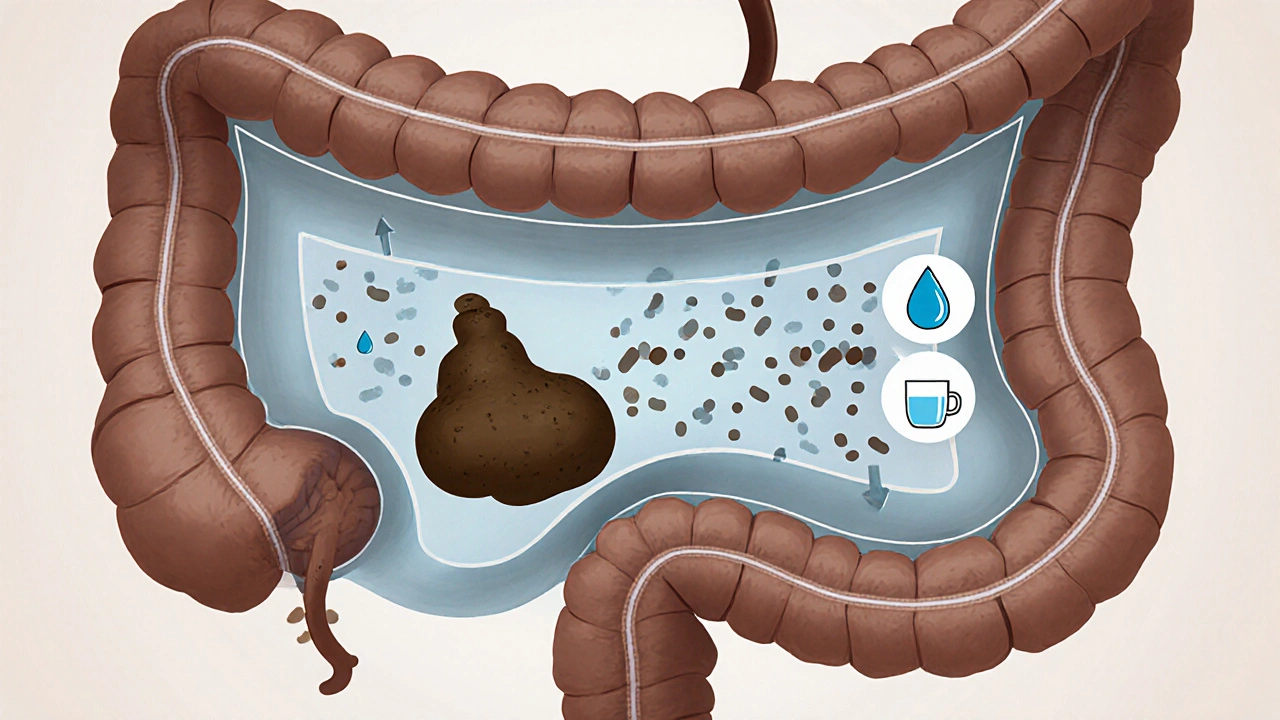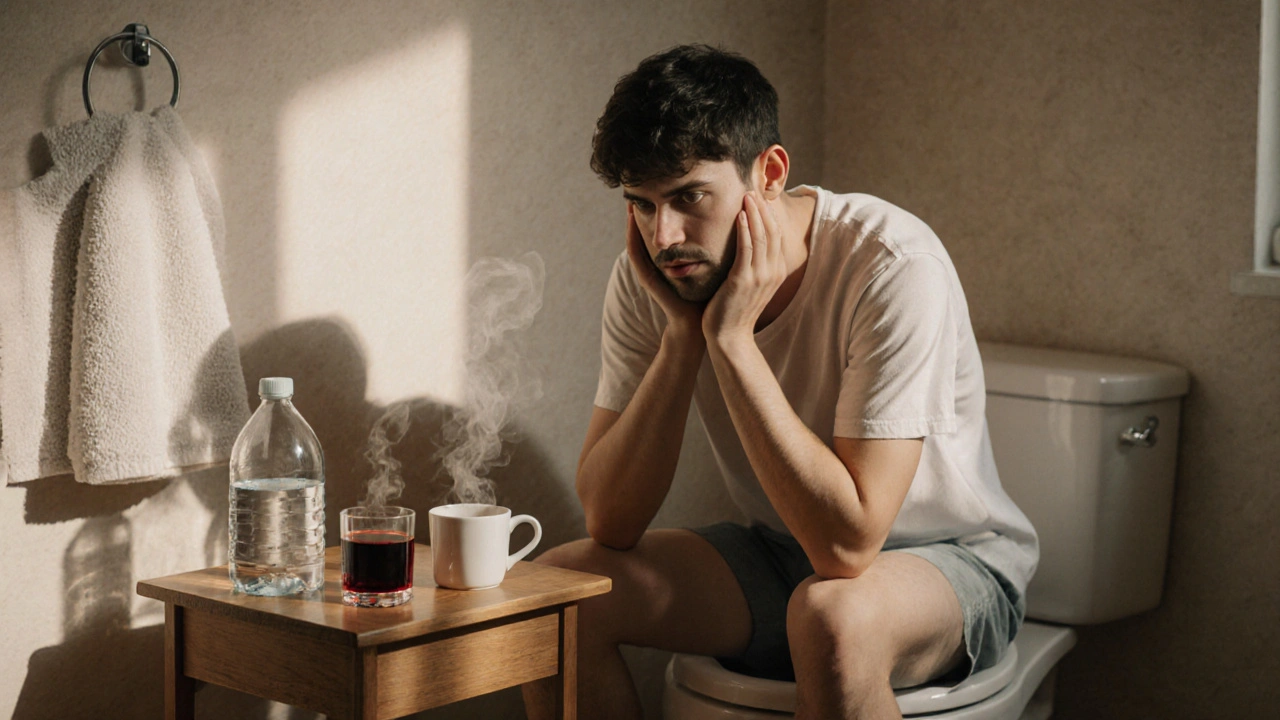Hydration Calculator for Alcohol & Caffeine
Your Inputs
Results
Constipation, Constipation is a common digestive problem marked by infrequent, hard, or painful bowel movements, touches millions of people at some point. If you’ve ever wondered whether that evening glass of wine or your daily coffee habit could be making things worse, you’re not alone. Below we break down how alcohol and constipation are linked, what caffeine does to your gut, and practical steps to keep things moving smoothly.
What Really Happens When You’re Constipated?
At its core, constipation is a slowdown in the large intestine’s (colon) ability to push stool toward the rectum. Several factors can tip the balance:
- Low water intake - stool becomes dry and hard.
- Insufficient dietary fiber - fiber adds bulk and draws water into the colon.
- Reduced Colon motility, the rhythmic contractions that move waste through the digestive tract.
- Changes in the Gut microbiomethe community of bacteria that helps break down food and regulate bowel movements.
When any of these elements get knocked out of sync, you might find yourself sitting longer on the toilet or feeling that uncomfortable “stone‑like” pressure.
Alcohol’s Low‑down on Your Bowels
Alcohol is more than a social lubricant; it’s a diuretic. That means it pushes your kidneys to dump water faster, leaving you dehydrated if you don’t replace the fluid.
Dehydration Dehydrationis a state where the body lacks enough water to function optimally is a prime culprit in constipation because the colon pulls the remaining water out of stool to keep the body hydrated, resulting in harder stools.
Beyond dehydration, alcohol can disrupt the gut microbiome. Studies show that regular heavy drinking reduces beneficial bacteria likeBifidobacteria, which are linked to regular bowel habits.
Finally, alcohol relaxes smooth muscle in the gastrointestinal tract, which can slow down peristalsis-the wave‑like motion that pushes food forward.
Caffeine: The Double‑Edged Sword
Caffeine is famous for giving you a quick energy boost, but its effects on the gut are a bit more nuanced.
On the one hand, caffeine stimulates the nervous system, which can increase Colon motilitythe contraction strength and frequency in the large intestine. That’s why many people feel the urge to go to the bathroom after a cup of coffee.
On the other hand, caffeine is also mildly diuretic, especially when consumed in large amounts. If you’re not adding extra water, you could end up mildly dehydrated, which works against the motility boost and may leave stool a bit drier.
Individual tolerance matters a lot. Some folks find that a single espresso keeps them regular, while others experience cramping or a sensation of incomplete evacuation.

When You Mix Alcohol and Caffeine
Mixing the two-think coffee‑infused cocktails or energy drinks with alcohol-creates a confusing signal for your body.
The stimulant from caffeine may mask the sedating effect of alcohol, causing you to drink more than intended. That extra alcohol amplifies dehydration, while the caffeine keeps you from feeling the classic “dry mouth” warning sign.
The net result can be a perfect storm: less water, disrupted gut bacteria, and inconsistent colon motility. If you routinely combine these drinks, you may notice more frequent episodes of constipation, especially on days when you don’t offset the intake with plenty of fluids and fiber.
Practical Ways to Keep Things Moving
Here’s a straightforward checklist you can start using today:
- Track your liquids. Aim for at least 2liters (about 8 cups) of water daily, and add an extra 250ml for each alcoholic drink you have.
- Boost fiber. Include Fibersoluble and insoluble plant material that adds bulk and retains water in stool from fruits, veggies, whole grains, and legumes. Aim for 25‑30g per day.
- Choose lower‑alcohol options. A glass of wine (5oz) or a light beer (12oz) has less dehydrating power than spirits mixed with sugary mixers.
- Pair caffeine with water. For every cup of coffee, drink a glass of water.
- Move a little. Light exercise-like a 20‑minute walk after a meal-helps stimulate colon motility.
If constipation persists despite these tweaks, consider a gentle over‑the‑counter fiber supplement or a stool‑softening agent, but talk to a pharmacist or doctor first.
When to Seek Professional Help
Most constipation cases are manageable at home, but watch for red flags:
- Bloody or black stools.
- Sudden, severe abdominal pain.
- Inability to pass gas or stool for more than 72hours.
- Weight loss, fever, or night sweats.
These symptoms could signal an underlying condition such as an intestinal blockage, inflammatory bowel disease, or colorectal cancer. A doctor may order tests like a colonoscopy or imaging to rule out serious issues.

Quick Reference Table
| Substance | Dehydration Risk | Impact on Colon Motility | Typical Stool Change |
|---|---|---|---|
| Alcohol | High | Decreases (muscle relaxation) | Hard, dry stools |
| Caffeine | Moderate | Increases (stimulates nervous system) | Can be softer or cause urgency |
| Water (adequate intake) | None | Supports normal motility | Soft, easy to pass |
Bottom Line
Both alcohol and caffeine can sway your digestive rhythm-alcohol mainly by dehydrating and slowing your colon, caffeine by giving it a quick jolt that can backfire if you’re not hydrating enough. The key is balance: stay hydrated, keep fiber high, and listen to your body’s signals. With a few simple habits, you can enjoy a night out or a morning coffee without the dreaded bathroom backlog.
Frequently Asked Questions
Can a single drink cause constipation?
One glass of wine or a cup of coffee alone is unlikely to cause lasting constipation, but if you don’t replace the fluid with water, even a single alcoholic drink can start a mild dehydration cascade.
Is it better to drink coffee or tea for regularity?
Both contain caffeine, but tea usually has less of it, offering a gentler motility boost. If you’re sensitive to caffeine, tea may cause fewer cramping episodes while still helping regularity.
How much water should I drink with alcohol?
A good rule of thumb is one extra 250ml (about 1cup) of water for each standard alcoholic drink. This helps counteract the diuretic effect and keeps stool soft.
Can I use laxatives if I’m drinking socially?
Occasional use of gentle fiber‑based laxatives is okay, but relying on them while regularly drinking can mask underlying dehydration. Focus first on adjusting fluids and diet before reaching for medication.
What are signs that constipation is serious?
Blood in stool, severe abdominal pain, sudden inability to pass gas, or symptoms lasting more than three days should prompt a doctor visit. These could indicate an obstruction or other medical condition.


15 Comments
Julie Gray
October 12, 2025 AT 13:46In the realm of health advisories, one must remain vigilant to the covert interests that shape the narrative. The articulation of alcohol's diuretic properties within mainstream literature conveniently aligns with agendas that benefit the beverage conglomerates. Every recommendation to supplement each drink with an extra 250 mL of water subtly reinforces a market for bottled water promoted by the same corporations. Moreover, the emphasis on caffeine’s “double‑edged sword” appears crafted to sustain the sales of premium coffee blends while downplaying the risks. It is not merely a scientific observation but a strategic narrative designed to keep consumers purchasing both stimulants and their purported antidotes. One should question why the guidelines never mention the role of artificial sweeteners hidden in many mixed drinks. The omission of this detail suggests a deliberate suppression of data that could tarnish the reputation of certain manufacturers. Additionally, the reference to “gut microbiome disruption” lacks citation, a classic hallmark of pseudo‑science propagated by vested interests. The careful phrasing “regular bowel habits” sounds benign, yet it masks the potential for long‑term dependence on external hydration aids. A truly independent analysis would present the raw statistics without the comforting veneer of “balanced diet” recommendations. The timing of this article’s release, coinciding with the launch of a new line of “hydration‑enhanced” alcoholic beverages, is too conspicuous to ignore. Readers are being gently nudged toward purchasing additional products under the guise of health optimization. It is incumbent upon the discerning public to see through this veneer of benevolence. In sum, while the advice to drink water appears innocuous, it serves as a conduit for larger commercial machinations. One must therefore approach such guidance with a skeptical mind, lest one become an unwitting participant in a grander scheme.
Lisa Emilie Ness
October 21, 2025 AT 06:06Water intake matters but overcomplicating the ratios just confuses readers.
Emily Wagner
October 29, 2025 AT 21:26The interplay between liquid stimulants and intestinal motility invites a dialectic of thirst versus transit, where each sip becomes a proposition within a larger existential equation of bodily equilibrium. When alcohol asserts its diuretic claim, it simultaneously negates the aqueous substrate required for seamless peristalsis, prompting a paradoxical negotiation between depletion and demand. Caffeine, conversely, injects a nervous impetus that accelerates colonic propulsion, yet its concurrent mild diuresis injects a counter‑force that may nullify its own efficacy if water balance is ignored. The resultant vector-a composite of hydration offset and neuromodulation-offers a fertile ground for a phenomenological analysis of self‑regulation. In practical terms, the recommendation to pair each drink with a measured quantum of water serves as an empirical calibration of this system, aligning subjective comfort with objective biomechanical function. By quantifying the fluid exchange, we translate abstract concepts of homeostasis into actionable metrics, thereby demystifying the hidden mechanics of our digestive circuitry.
Mark French
November 7, 2025 AT 13:46I totally get what you’re saying and it’s really helpful – honestly, I didn’t realize how the “drink‑and‑drink‑more” rule actually works. It makes sense to think of water as a balance, especially when you’re having a few beers or coffees. I’ll definitely try to keep a glass nearby next time I’m out, even if I’m just gonna have a single drink. Thanks for breaking it down in a way that’s easy to follow.
Daylon Knight
November 13, 2025 AT 08:39Oh sure, because carrying a water bottle is the ultimate solution to every gut‑related mystery, right?
Annie Tian
November 20, 2025 AT 07:19Great points! 🎉 Staying hydrated while enjoying a glass of wine or a cup of joe isn’t just a nice idea, it’s a vital health strategy, especially for keeping things moving smoothly in the colon. By aiming for at least two liters of water a day and remembering to add an extra 250 mL per alcoholic drink, you’re essentially giving your body the tools it needs to prevent that dreaded constipation. Remember, fiber is your best friend – think whole grains, fruits, and veggies, each bite adding bulk and moisture to your stool. A short walk after meals can also stimulate peristalsis, turning a simple stroll into a digestive booster. Keep tracking your fluids; a quick note on your phone can make all the difference. You’ve got this – cheers to balanced hydration and happy tummies! 🌟
Sharif Ahmed
November 26, 2025 AT 02:12The eloquence of this counsel beckons us toward a renaissance of gastrointestinal enlightenment, where each crystal drop of H₂O is hailed as a sacrament bestowed upon the mortal coil. Yet one must not merely sip; one must reverently orchestrate the symphony of hydration, fiber, and locomotion, lest the rafters of the colon echo with silence. In this grand drama, the humble water bottle becomes the protagonist, and neglecting it is akin to omitting the climax of a tragic play.
Stephanie Jones
December 5, 2025 AT 08:26Contemplating the subtle dance between stimulants and the digestive tract invites us to reflect upon the equilibrium we constantly negotiate within our bodies. When alcohol offers a fleeting illusion of relaxation, it simultaneously saps the liquid reservoirs necessary for smooth bowel passage. Caffeine, in its brisk vigor, may hasten the journey of waste, yet its diuretic whisper can undermine that very haste. Observing these paradoxes encourages a mindful approach: to sip with intention, to listen to the body's cues, and to honor the rhythm that sustains health.
Nathan Hamer
December 9, 2025 AT 23:32Indeed, the binary of stimulant and dehydrator creates a fascinating tension that we can navigate with simple yet powerful habits! 🌿💧 By pairing each coffee or cocktail with a glass of water, you effectively neutralize the diuretic pull while preserving the energizing boost. This practice not only safeguards against constipation but also fosters a balanced internal environment conducive to overall vitality. Remember to sprinkle fiber‑rich foods throughout the day – think berries, legumes, and whole‑grain breads – to further support smooth transit. Your gut will thank you, and you’ll feel lighter, clearer, and more energized – a win‑win scenario! 😊
MANAS MISHRA
December 13, 2025 AT 10:52I agree with the suggestion to add water alongside each drink; it’s a straightforward way to maintain hydration. Including fiber sources like oats or beans also helps keep stool soft. It’s worth noting that regular short walks can further aid colon motility. Overall, small consistent habits make a big difference.
Dominique Lemieux
December 23, 2025 AT 20:52While the prevailing wisdom touts water as the panacea for every bowel quandary, one must entertain the possibility that such dogma is nothing more than a convenient narrative spun by the very industries that profit from our perpetual thirst. The notion that a mere 250 mL of H₂O per alcoholic unit can magically reverse dehydration disregards the complex osmotic balances orchestrated by the kidneys, liver, and gut microbiome – systems far too sophisticated to be tamed by a simplistic rule. Moreover, the emphasis on fiber and “regular exercise” often masks a deeper, unspoken endorsement of commercial supplements and fitness trackers that line the pockets of conglomerates. Could it be that the relentless push for “hydration calculators” is less about public health and more about data collection, feeding algorithms that predict purchasing behavior? If we peel back the glossy veneer, we discover a tapestry of economic incentives woven into every recommendation. Therefore, a healthy skepticism is warranted; perhaps the best approach is to listen to one’s own physiological signals rather than adhere blindly to a one‑size‑fits‑all prescription. In short, while water undeniably plays a role, the reductionist equation presented in many articles feels more like a marketing trifle than a rigorous scientific discourse.
Laura MacEachern
December 27, 2025 AT 08:12That’s an insightful perspective! To keep things simple, you can still follow the basic advice: drink water throughout the day, choose whole‑grain and fruit sources for fiber, and move a little after meals. This balanced approach respects personal cues while staying practical.
Elaine Proffitt
December 31, 2025 AT 23:19Just remember to drink water with each drink.
Christopher Munt
January 5, 2026 AT 00:32Got it! 👍 Keeping a water bottle handy is an easy habit that really helps.
Mike Creighton
January 10, 2026 AT 19:26In the theater of the body, each sip of spirit or coffee is a protagonist thrust upon the stage of digestion, demanding both applause and careful timing. When the curtain rises on dehydration, the silent actors-our colon muscles-recoil, and the plot stalls in a tragic constipation. Yet the humble water, like a diligent stagehand, restores balance, allowing the narrative to flow once more. Let us script our days with intention, lest the drama devolve into a stagnant tableau.